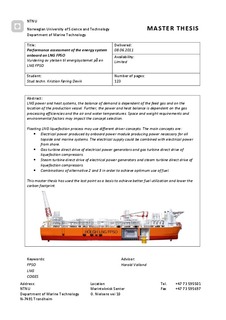| dc.contributor.author | Devik, Kristian Føring | nb_NO |
| dc.date.accessioned | 2014-12-19T12:06:43Z | |
| dc.date.available | 2014-12-19T12:06:43Z | |
| dc.date.created | 2012-02-09 | nb_NO |
| dc.date.issued | 2011 | nb_NO |
| dc.identifier | 495575 | nb_NO |
| dc.identifier.uri | http://hdl.handle.net/11250/237984 | |
| dc.description.abstract | LNG power and heat systems, the balance of demand is dependent of the feed gas and on the location of the production vessel. Further, the power and heat balance is dependent on the gas processing efficiencies and the air and water temperatures. Space and weight requirements and environmental factors may impact the concept selection.
Floating LNG liquefaction process may use different driver concepts. The main concepts are:
Electrical power produced by onboard power module producing power necessary for all topside and marine systems. The electrical supply could be combined with electrical power from shore.Gas turbine direct drive of electrical power generators and gas turbine direct drive of liquefaction compressors.Steam turbine direct drive of electrical power generators and steam turbine direct drive of liquefaction compressors.Combinations of alternative 2 and 3 in order to achieve optimum use of fuel.
This master thesis has used the last point as a basis to achieve better fuel utilization and lower the carbon footprint. | nb_NO |
| dc.language | eng | nb_NO |
| dc.publisher | Norges teknisk-naturvitenskapelige universitet, Fakultet for ingeniørvitenskap og teknologi, Institutt for marin teknikk | nb_NO |
| dc.title | Performance assessment of the energy system onboard an LNG FPSO | nb_NO |
| dc.title.alternative | Vurdering av ytelsen til energisystemet på en LNG FPSO | nb_NO |
| dc.type | Master thesis | nb_NO |
| dc.contributor.department | Norges teknisk-naturvitenskapelige universitet, Fakultet for ingeniørvitenskap og teknologi, Institutt for marin teknikk | nb_NO |
